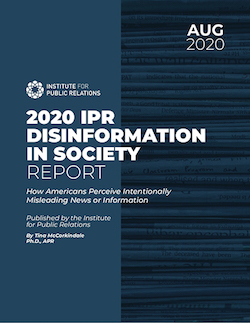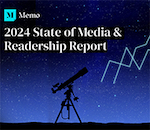A majority of Americans now consider the spread of fake news to be among the worst societal issues facing the country, according to a report from the Institute for Public Relations.
 |
The report, which examined Americans’ trust in the media as well as the perceived prevalence of misleading or biased information in the U.S., found that an overwhelming majority of respondents (84 percent) think disinformation is a problem in this country, more than two-thirds (69 percent) believe disinformation undermines our election process and nearly three-quarters (72 percent) consider disinformation to be a threat to democracy.
In fact, the 61 percent of Americans who said they’re currently concerned about disinformation surpassed the percentage of Americans concerned about other societal problems such as illegal drug use or abuse (55 percent), crime (55 percent), gun violence (54 percent) and political partisanship (53 percent).
Disinformation has now altered how Americans consume news. Nearly a third (31 percent) claim they avoid watching or listening to the news because of the amount of disinformation in the U.S., and a quarter (24 percent) said they’re now more likely to turn to foreign news sources over domestic sources.
Nearly half of respondents (49 percent) said they encounter false news or disinformation almost every day.
Respondents said they consider Facebook and politicians (both 70 percent) the sources most responsible for spreading fake news to the public. This was followed by fake social media accounts (65 percent), the government (63 percent), Republican members of Congress (62 percent) and political activist groups and journalists (both 61 percent).
A few concerns take precedence over fake news. According to the report, Americans think infectious disease outbreaks (74 percent) and healthcare costs (72 percent) are the two most significant problems facing Americans this year.
The report also found that, comparatively, the public’s anxiety toward disinformation also appears to have declined somewhat in the last year: the 61 percent of those surveyed who said they’re concerned about misinformation revealed a dip from the 65 percent reported in IPR’s previous 2019 study on media trust.
Naturally, respondents identifying as conservative and liberal differ widely regarding what news sources they consider trustworthy: the former trust Fox News, while the latter gravitate toward CNN, The New York Times and MSNBC. But there remains one media source that appears to have largely avoided political polarization: local news. Overall, 70 percent of respondents said they have at least “some trust” in local broadcast TV news and 60 percent said they trust local newspapers.
IPR’s “2020 IPR Disinformation in Society Report” was written by IPR President and CEO Dr. Tina McCorkindale and Peppercomm founder and IPR chair Steve Cody. The report surveyed 2,200 Americans in late March. Surveys were conducted online by data intelligence company The Morning Consult.
IPR is the nonprofit PR research organization based at the University of Florida.


 Trump Media & Technology Group today reported a $58.2M net loss on $4.1M in 2023 revenues, a disclosure that drove its stock price down 22.6 percent to $47.96.
Trump Media & Technology Group today reported a $58.2M net loss on $4.1M in 2023 revenues, a disclosure that drove its stock price down 22.6 percent to $47.96. Barry Pollack, an attorney at Wall Street’s Harris St. Laurent & Wechsler, has registered Julian Assange as a client with the Justice Dept. “out of an abundance of caution.”
Barry Pollack, an attorney at Wall Street’s Harris St. Laurent & Wechsler, has registered Julian Assange as a client with the Justice Dept. “out of an abundance of caution.” Paramount Global to slash 800 jobs in what chief executive Bob Bakish calls part of an effort to “return the company to earnings growth"... Rolling Stone editor-in-chief Noah Shachtman is exiting at the end of the month due to disagreements with chief executive Gus Wenner over the direction the magazine is taking... The New York Times broke the $1 billion barrier in annual revenue from digital subscriptions in 2023... Press Forward is investing more than $500 million to strengthen local newsrooms.
Paramount Global to slash 800 jobs in what chief executive Bob Bakish calls part of an effort to “return the company to earnings growth"... Rolling Stone editor-in-chief Noah Shachtman is exiting at the end of the month due to disagreements with chief executive Gus Wenner over the direction the magazine is taking... The New York Times broke the $1 billion barrier in annual revenue from digital subscriptions in 2023... Press Forward is investing more than $500 million to strengthen local newsrooms. The majority of news articles are read within the first three days of publication, according to a recent report.
The majority of news articles are read within the first three days of publication, according to a recent report. The Los Angeles Times gives pink slips to 115 people or 20 percent of its newsroom staff... TIME is also laying off about 30 employees, which is approximately 15 percent of its editorial staff... The Baltimore Banner, which was launched by Stewart Bainum in 2022 after he failed to buy the Baltimore Sun, added 500 subscribers per day in the three days following Sinclair Broadcast Group's deal to purchase the Sun.
The Los Angeles Times gives pink slips to 115 people or 20 percent of its newsroom staff... TIME is also laying off about 30 employees, which is approximately 15 percent of its editorial staff... The Baltimore Banner, which was launched by Stewart Bainum in 2022 after he failed to buy the Baltimore Sun, added 500 subscribers per day in the three days following Sinclair Broadcast Group's deal to purchase the Sun.


 Have a comment? Send it to
Have a comment? Send it to 
No comments have been submitted for this story yet.